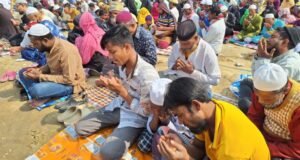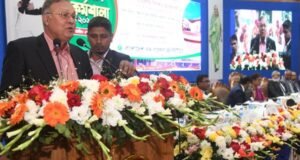 There is a risk of serious outbreaks of disease in the aftermath of the Nepal earthquake, aid agencies have warned.
There is a risk of serious outbreaks of disease in the aftermath of the Nepal earthquake, aid agencies have warned.
A lack of shelter, contaminated water and poor sanitation could lead to cholera, dysentery and other water-borne diseases, the charities said.
The UK’s Disasters Emergency Committee (DEC) said in some areas people were living and defecating in the open.
The umbrella organisation, formed of 12 charities, said immediate action was needed to tackle the problem.
The 7.8-magnitude earthquake is now known to have killed more than 7,500 people and injured more than 14,500.
More than 4,000 aid workers from around the world have been helping with relief and rescue operations.
Charities are relying on volunteers to treat those wounded in Nepal
A spokesman for the DEC, which has been running a major appeal to provide aid to the country, said there had already been reports of diarrhoea outbreaks and chest infections.
DEC member agencies have been working to provide better emergency shelter and to ensure drinking water and sanitation are a part of the emergency response.
The scale and cost of this aspect of the response are still being assessed but it was clear action was needed now before the rainy season starts in June, a spokesman said.
“Cholera is endemic in Nepal, so an outbreak would not be unprecedented; last year 600 people caught cholera and in 2009 a major outbreak affected more than 300,000 people,” he added.
Nepal earthquake relief
$415 million needed for humanitarian relief
• 3 million people in need of food aid
• 130,000 houses destroyed
• 24,000 people living in makeshift camps
• 20 teams working to reunite lost children with their families
The DEC appeal has so far raised £33m from public donations. The UK government has matched the first £5m of donations, bringing the total to £38m, and committed a further £17.8m in humanitarian aid, making it the largest international donor with a total contribution of £22.8m.
Based on pledges, aid agencies in Nepal have already provided clean drinking water, soap, blankets and mattresses to tens of thousands of people, DEC said.
“One week on and the response by the UK public continues to amaze me,” DEC chief executive Saleh Saeed said.
“The funds mean we are able to increase the humanitarian response and despite immense challenges, aid is getting through to more and more people who desperately need it.”
The relief effort was being hampered by the damage to Nepal’s roads and sole international airport, as well as fuel shortages and limited electricity, Mr Saeed added.
The Royal Air Force has flown aid into Nepal after the devastating earthquake
British rescuers have been playing a key role in the relief effort which has followed the Nepal earthquake.
Among the work by the UK International Search and Rescue team deployed by the Department for International Development has been taking a four-year-old girl with a serious leg injury to a field hospital for treatment and treating a young boy’s broken arm using a plastic bottle as a splint.
Glynnis Brooks, head of health, water, sanitation and hygiene at the British Red Cross, said: “Water and sanitation remain critical at this stage of the disaster, as those affected are generally much more susceptible to illness and death from disease.
“Given the scale of the damage to infrastructure near the epicentre of the quake, rehabilitation of water supplies will take time, so it is essential that humanitarian agencies assist the government by providing people affected with clean, safe water supplies.”
Among the DEC member agencies, Oxfam has been providing water and sanitation in four camps in the Kathmandu Valley and Action Aid has distributed disinfectant kits for cleaning to 2,500 people in Khokana and Paanga just outside Kathmandu.
Care has been delivering jerry cans and hygiene items including soap, and is also distributing water purification tablets to people who are particularly susceptible to water-borne illness such as diarrhoea.
 Weekly Bangla Mirror | Bangla Mirror, Bangladeshi news in UK, bangla mirror news
Weekly Bangla Mirror | Bangla Mirror, Bangladeshi news in UK, bangla mirror news





